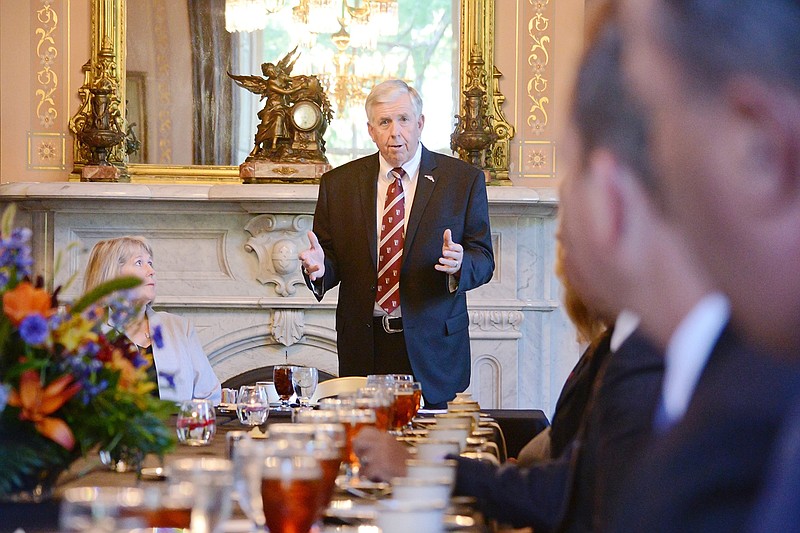Gov. Mike Parson invited a number of Missouri agriculture leaders Wednesday to a "working dinner" at the Mansion.
He told reporters before the dinner began: "We're going to be talking about the drought (and) some things going on in agriculture that are important to this state.
"It's really just a listening (event) and trying to get a chance to sit down and talk."
Parson, who raises cattle on a farm near Bolivar, ran for lieutenant governor two years ago with strong support from many agriculture-related groups and organizations.
He became governor June 1, when Eric Greitens resigned, and noted Wednesday's dinner was the "first time I've been able" to visit with those groups since becoming governor.
The dinner and discussion were closed to the media, but Parson said he expected tariffs - imposed on American products by other countries after President Donald Trump imposed tariffs on some of those nations' goods - to be one of the discussion topics.
Missouri soybean producers are among those concerned by the prospects of a trade war.
A University of Missouri report showed in 2016 that soybean exports were worth nearly $1.259 billion - almost 35 percent of all agricultural exports that year.
Missouri Soybean Association President C. Brooks Hurst, of Tarkio, said in an opinion column earlier this year, "The Chinese Commerce Department's proposal to roughly triple tariffs on U.S. soybean is a substantial threat to Missouri soybean farmers' bottom line, in a time of already tight farm margins.
"Soybean is Missouri's number one cash crop, contributing $7.7 billion in total output, $3.2 billion in added value, $1.4 billion in labor income to the state's economy, and supporting more than 20,700 jobs.
"China is the destination for nearly one out of every three rows of annual soy production (nationwide), and 60 percent of total U.S. exports. In 2017, China imported $13.9 billion of U.S. soybean."
Parson told reporters Wednesday, "A couple of weeks ago, I was in Washington, D.C., talked with the President and brought up the tariffs, and told him how important (the issue) was for the state of Missouri, and how it could have an effect on us.
"But, I think it's unclear, yet, what that end result is going to be."
He hopes a coalition of state agriculture leaders, along with Missouri's congressional delegation, can work with Trump and other leaders "to figure out a solution."
Parson was asked if Missouri's Agriculture Department has enough funding to maintain the inspections needed to determine the amount of damage caused by dicamba, a broad-spectrum herbicide that can cause damage in neighbors' fields.
The governor said, "Agriculture is the No. 1 industry in the state, and we've got to do everything we can to protect that industry.
"I'm going to try my best to make sure they have the tools they need to do the job.
"If we need more inspectors for that, we'll sit down with the director and we'll talk about that."
Parson said he has always felt the state Agriculture Department "has not been funded to the level I personally would like to see."
Wednesday evening's dinner followed an afternoon meeting in Odessa with some of the state's small-town mayors, including Tipton's Jennifer Cary.
"The same subjects come up over and over again," the governor said. "It's infrastructure and workforce development."
Parson met last month with mayors from larger cities, including Carrie Tergin from Jefferson City and Brian Treece from Columbia.
However, he told reporters Wednesday evening, there are few differences between what the urban leaders are saying and what he hears from the rural areas.
"I think it's the same message," he said. "I think it's just implemented (in) different ways.
"Kansas City and St. Louis have the same problems as Lexington, Missouri."
The meetings with mayors and leaders from various industries are providing an "opportunity for us - for myself as the governor, and for the legislators and the people of Missouri - to really lead, to be able to go out and say, 'We know what the real problems are. It's infrastructure and workforce development.'"
The challenge, Parson said, is to figure out "how do we do things differently than what we've done in the past?"
Wednesday morning, the governor attended a ribbon-cutting ceremony for the Dollar Tree company's new 1.2 million-square-foot distribution center in Warrensburg - part of a planned $110 million investment Dollar Tree expects will create 375 jobs by 2020.
"When you listen to these companies (about) why did they decide to come to Missouri," Parson said, "it's those things you can build on, when they start talking about work ethic, our communities (and) how well they like them (and) the education system.
"Infrastructure is a very big deal to these companies."
He didn't comment on it Wednesday, but Parson in the past has voiced support for the statewide vote in November to raise Missouri's fuels tax by 10 cents a gallon, phased in over four years.
If approved, that increase would provide some dedicated funding for the Highway Patrol, while also adding more money into the Transportation Departments's annual budget for road and bridge maintenance and repairs.

